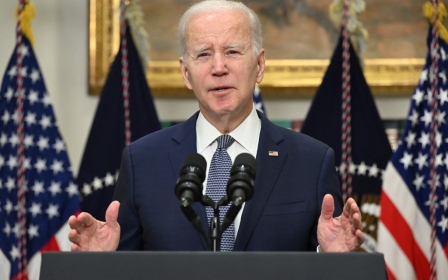Israel: Protesters reject government's softening of judiciary bill

Protesters in Israel have rejected an attempt by the government to soften the controversial legislation overhauling the judiciary, describing it as a "declaration of war".
The government said on Monday that it was accepting an amendment by Religious Zionism MK Simcha Rothman that would limit the power of the government to overrule decisions at the Supreme Court.
The bill originally proposed a shake-up of the selection panel for judges, expanding the number to 11 and including three cabinet ministers, two coalition lawmakers and two public figures chosen by the government, spelling a 7-4 vote majority.
The amendment changes this to three cabinet ministers, three coalition lawmakers, three judges and two opposition lawmakers, making government vetos less assured.
The softening of the bill came after a phone call between Israeli Prime Minister Benjamin Netanyahu and US President Joe Biden, who urged for compromise over the bill.
In its statement, the government said the changes represented "extending a hand to anyone who genuinely cares about national unity and the desire to reach an agreed accord".
However, the leaders of Israel's protest movement against the bill rejected the move, saying the government had decided "to divide our nation and carry out a hostile takeover of the Supreme Court".
"This isn’t a softer proposal, but rather a declaration of war by the Israeli government against its people and Israeli democracy," they said in a statement to Haaretz on Monday.
They added that the legislation was "the first chapter in turning Israel into a dictatorship. This is a transparent attempt to numb the protest movement".
Haaretz reported that the coalition plans on passing this proposal before the Knesset recess in early April, while the rest of the judicial overhaul legislation will be delayed until the summer.
Later on Monday, Israel's political opposition also said they would be filing a Supreme Court challenge against the legislation.
"The moment the change to the Judicial Appointments Committee passes, we will appeal against it at the Supreme Court," opposition leader Yair Lapid told his faction.
Israel is currently experiencing a political crisis that has pitted Netanyahu’s far-right government against the country’s civil society, academic and business elite, as well as former government ministers and military figures.
The prime minister is currently on trial for corruption, and the reforms could enable him to evade conviction or see his case dismissed.
Since being indicted in 2019, Netanyahu has railed publicly against the justice system, saying it is biased against him.
Nadav Argaman, former director of the Shin Bet, Israel's internal security service, hit out at the reforms on Thursday evening, warning they were "legally turning Israel into a dictatorship".
On Monday, Haaretz reported that Defense Minister Yoav Gallant told Netanyahu that he would have "difficulty continuing as a minister" if the bill passed in its current form, citing the lack of consensus among the parties and the public.
Middle East Eye propose une couverture et une analyse indépendantes et incomparables du Moyen-Orient, de l’Afrique du Nord et d’autres régions du monde. Pour en savoir plus sur la reprise de ce contenu et les frais qui s’appliquent, veuillez remplir ce formulaire [en anglais]. Pour en savoir plus sur MEE, cliquez ici [en anglais].





